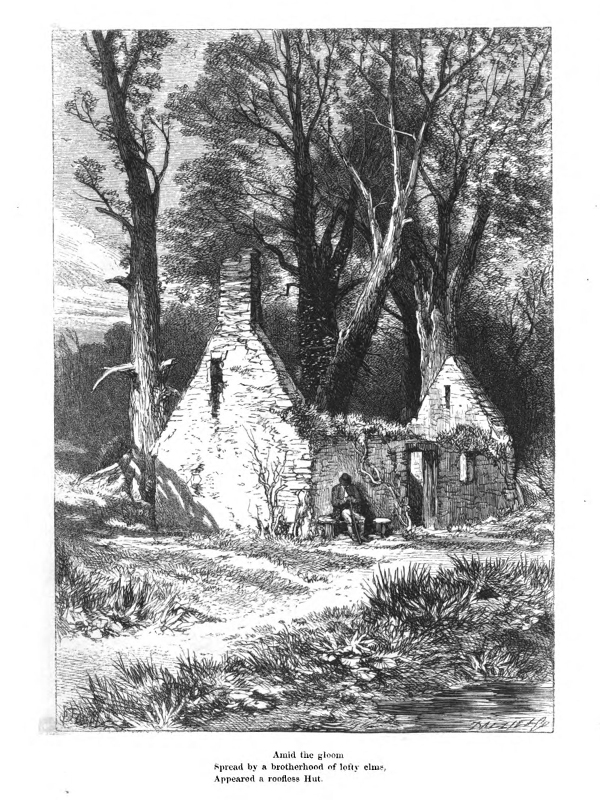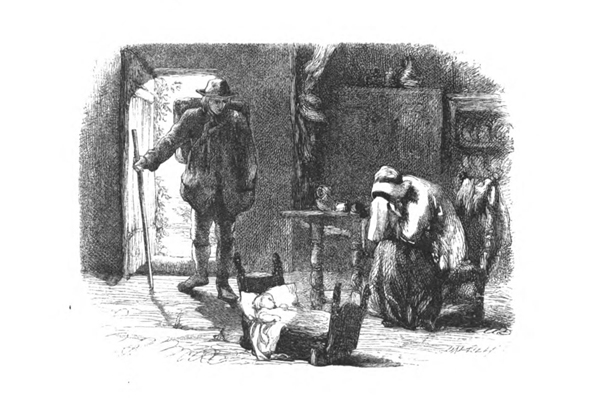The Ruined Cottage

1. Social and Political Context: The Famine of 1794-95 and the decline of hand-loom weaving industry.
2. The Literary Tradition of Elegy
3. Passages from "The Ruined Cottage"
1. Wordsworth's own elegy
The old Man said, "I see around me here
Things which you cannot see: we die, my Friend,
Nor we alone, but that which each man loved
And prized in his peculiar nook of earth
Dies with him or is changed, and very soon
Even of the good is no memorial left.
The Poets in their elegies and songs
Lamenting the departed call the groves,
They call upon the hills and streams to mourn,
And senseless rocks, nor idly; for they speak
In these their invocations with a voice
Obedient to the strong creative power
Of human passion. Sympathies there are
More tranquil, yet perhaps of kindred birth,
That steal upon the meditative mind
And grow with thought.
(ll. 67-82)

2. The moral purpose of poetic mourning: "A power to virtue friendly"
"It were a wantonness and would demand
Severe reproof, if we were men whose hearts
Could hold vain dalliance with the misery
Even of the dead, contented thence to draw
A momentary pleasure never marked
By reason, barren of all future good.
But we have known that there is often found
In mournful thoughts, and always might be found,
A power to virtue friendly; were't not so,
I am a dreamer among men, indeed
An idle dreamer. 'Tis a common tale,
By moving accidents uncharactered,
A tale of silent suffering, hardly clothed
In bodily form, and to the grosser sense
But ill adapted, scarcely palpable
To him who does not think.
(ll. 221-236)
3. Wordsworth's moral conclusion: a poetic education
"My Friend, enough to sorrow have you given,
The purposes of wisdom ask no more;
Be wise and chearful, and no longer read
The forms of things with an unworthy eye.
She sleeps in the calm earth, and peace is here.
I well remember that those very plumes,
Those weeds, and the high spear-grass on that wall,
By mist and silent rain-drops silver'd o'er,
As once I passed did to my heart convey
So still an image of tranquillity,
So calm and still, and looked so beautiful
Amid the uneasy thoughts which filled my mind,
That what we feel of sorrow and despair
From ruin and from change, and all the grief
The passing shews of being leave behind,
Appeared an idle dream that could not live
Where meditation was. I turned away
And walked along my road in happiness."
He ceased. By this the sun declining shot
A slant and mellow radiance which began
To fall upon us where beneath the trees
We sate on that low bench, and now we felt,
Admonished thus, the sweet hour coming on.
A linnet warbled from those lofty elms,
A thrush sang loud, and other melodies,
At distance heard, peopled the milder air.
The old man rose and hoisted up his load.
Together casting then a farewell look
Upon those silent walls, we left the shade
And ere the stars were visible attained
A rustic inn, our evening resting-place.
(ll. 508-538)
| ||||
| ||||
| ||||
| ||||
| ||||
British Library Article on The Ruined Cottage
 Related Binaries
Related Binaries
